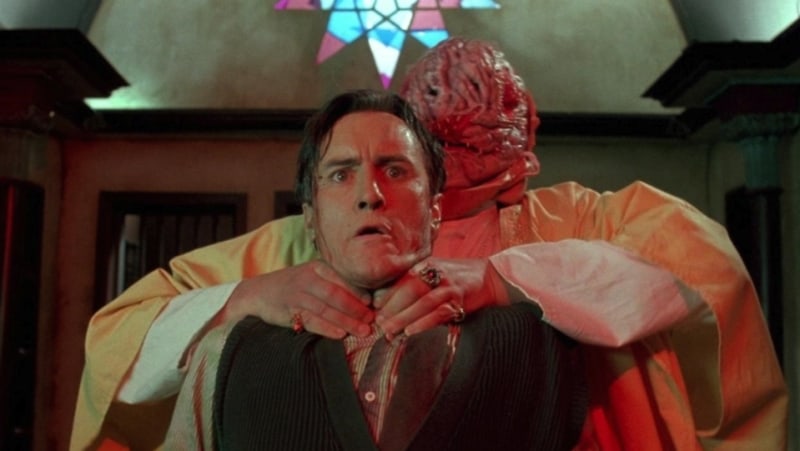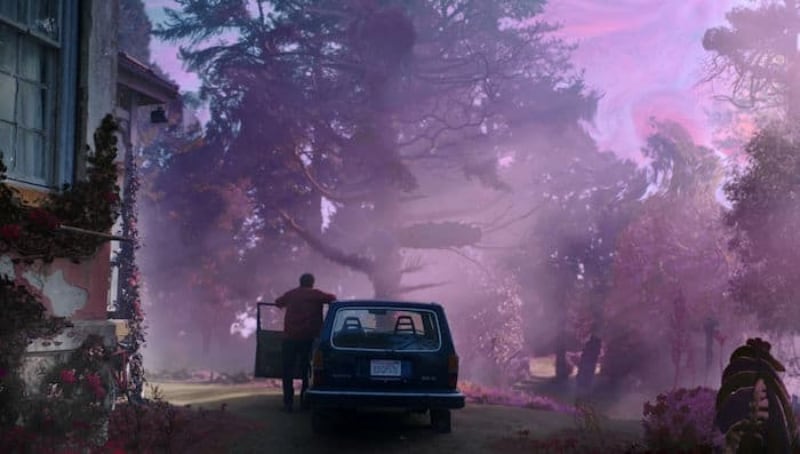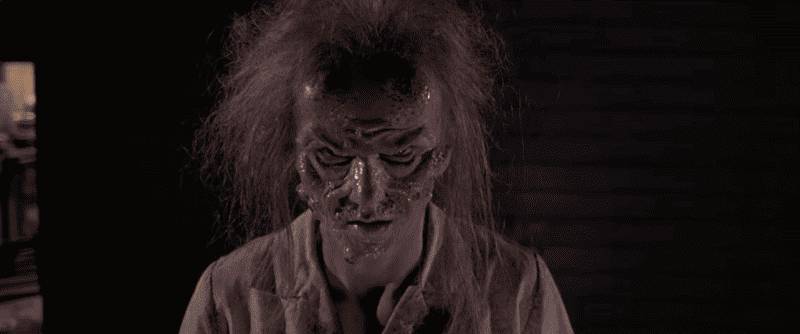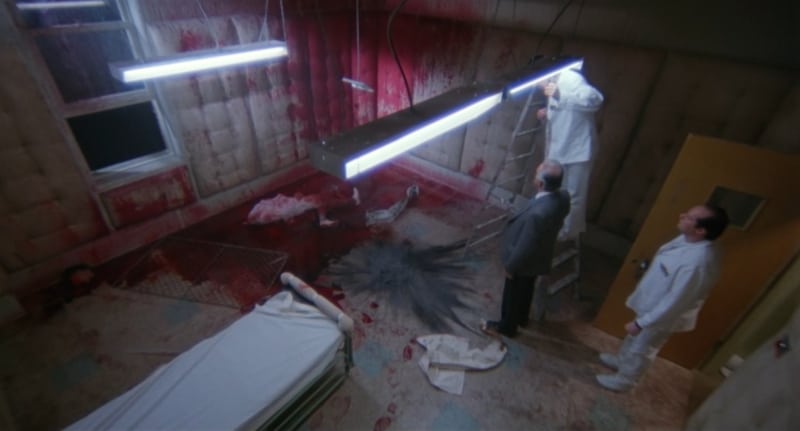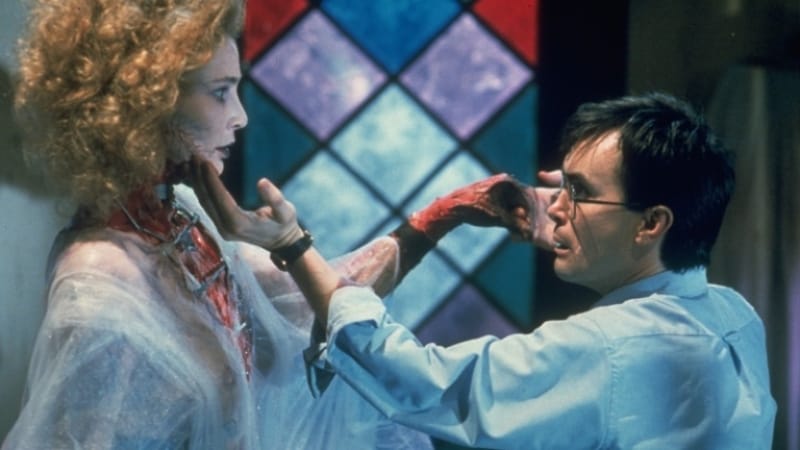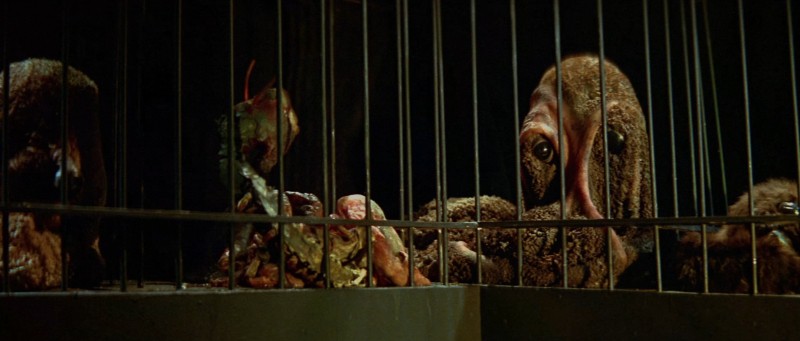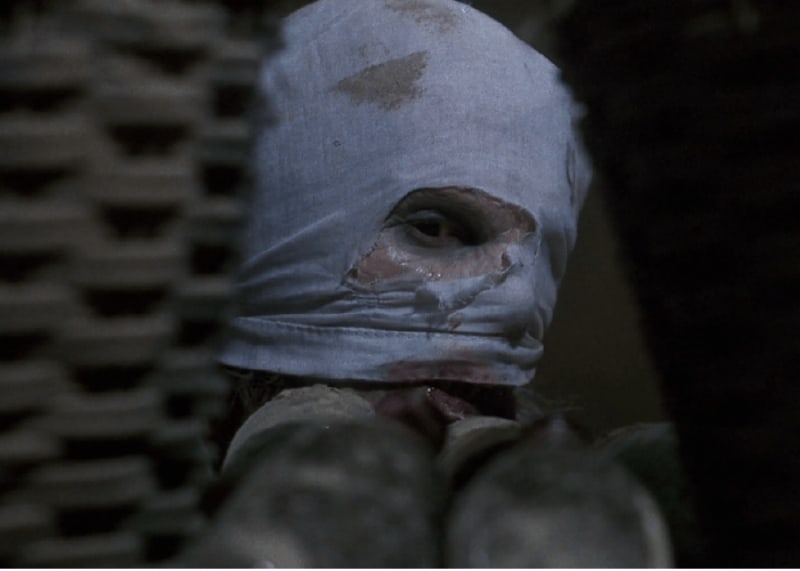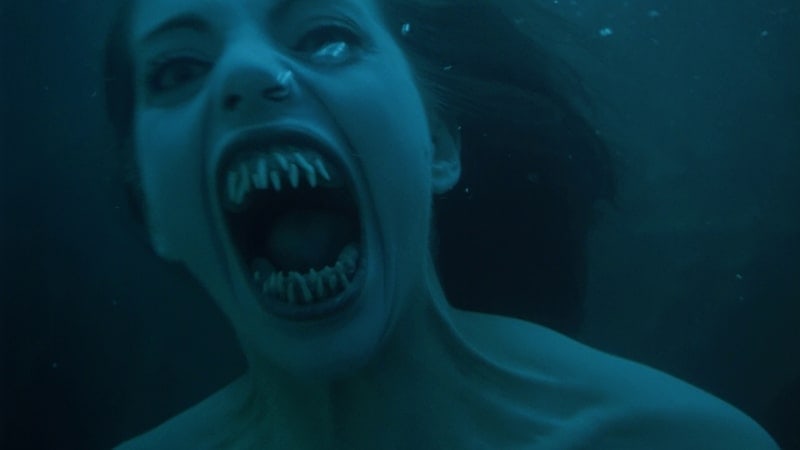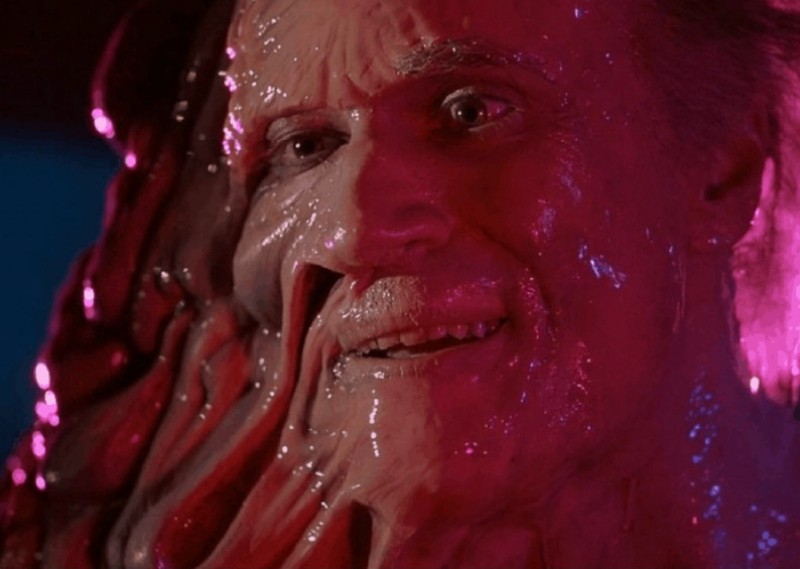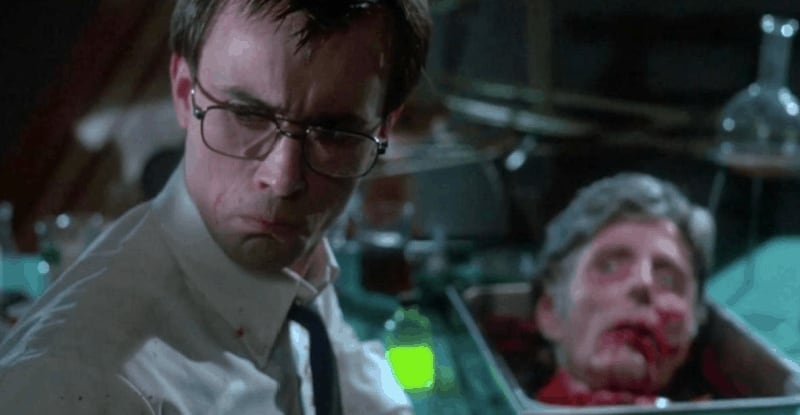There’s a lot of incredibly good reasons to hate this foundational horror writer, but these ten films are not among them.
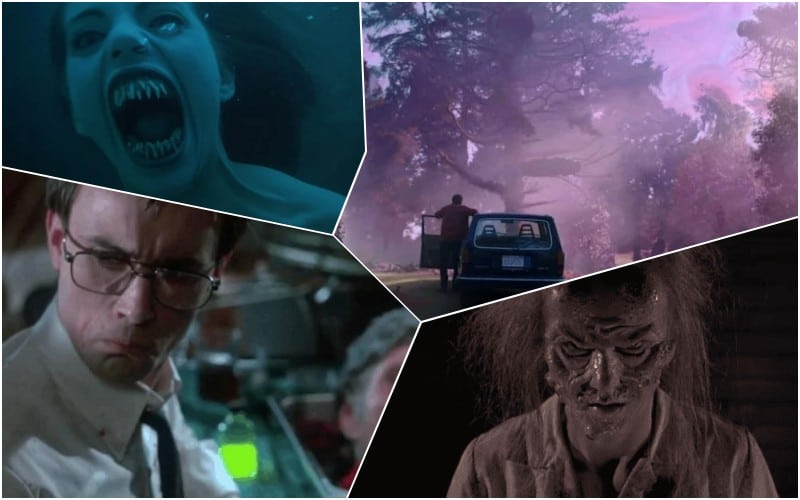
October is defined in Webster’s Dictionary as “31 days of horror.” Don’t bother looking it up; it’s true. Most people take that to mean highlighting one horror movie a day, but here at FSR, we’ve taken that up a spooky notch or nine by celebrating each day with a top ten list. This article about the best film adaptations of H.P. Lovecraft’s work is part of our ongoing series 31 Days of Horror Lists.
It’s difficult to deny the impact H.P. Lovecraft had on horror. His influence is traceable through the last century of genre storytelling. Whenever we see a creature feature or sci-fi film that delivers spooky cosmic vibes, our minds conjure the name Lovecraft. Though to be fair, one can argue the core of what we love about Lovecraftian Horror should actually be attributed to the writers who inspired him, like M.R. James and Algernon Blackwood. But that’s an argument for a different top ten list.
To enjoy Lovecraft today, though, means directly addressing the disgusting legacy he left behind. And I don’t just mean those outlandish creatures with millions of eyeballs. As it is well known today, Lovecraft was a deeply racist and xenophobic man. Reading his letters and poetry, not to mention his short stories like The Horror at Red Hook reveals an indefensible bigot regardless of the foundational nature of his stories. It makes me think of Lovecraft as a 4Chan user for early 20th Century America. He was someone who unrepentantly relishes in his bigotry. To try and wave away or diminish how Lovecraft’s prejudices infected and impacted his work is to deny what is right in front of our own eyes. Even worse, by leaning into his hatred of the other, Lovecraft undermined the genius at the core of his storytelling.
But because the shepherds of Lovecraft’s work through the 20th century seemed to purposefully overlook the depths of his racism, his weird tales propagated through pop culture until he became irreversibly entwined with the genre. That means it’s almost impossible to extract Lovecraft’s influence from horror without losing a large chunk of horror storytelling itself.
Due to this, I find it’s important always to take a moment to recognize the real person behind the legendary stories when celebrating his contributions to the genre. Lovecraft was a vile racist. But he also gave us foundational horror that the following films on this list bring to life. Luckily for Brad Gullickson, Chris Coffel, Meg Shields, Rob Hunter, and yours truly, these adaptations shed all of Lovecraft’s racism to weave fresh tales that improve on what this literary horror titan created.
10. Necronomicon (1993)
It’s not often you watch an anthology movie for the wraparound story alone. But when that wraparound story features Jeffrey Combs playing H.P. Lovecraft as an Indiana Jones-esque occult treasure hunter? Who really cares what happens in the individual segments? That’s not to disparage the rest of Brian Yuzna’s film. But much like Comb’s heroic reimagining of an unheroic man, the three segments that make up the meat of Necronomicon aren’t true Lovecraft. The film just takes the essence of a Lovecraftian idea and spins it out into new, cheesy directions.
Like all anthology films, sometimes those directions work, and sometimes they don’t. But when has an uneven film ever stopped us horror fans from becoming obsessed with something, amirite? Necronomicon may not be the most faithful adaptation of Lovecraft’s body of work, but it’s certainly one of the most obscure and unique, thanks in no small part to Jeffrey Combs’ eye-catching portrayal of the writer. (Jacob Trussell)
9. Color Out of Space (2019)
Richard Stanley’s adaptation of Lovecraft’s famous short story “The Colour Out of Space” makes marvelous usage of color. With hypnotic hues of neon pink and icy blue, we’re given a spectrum of light that can accurately convey (as much as one can) the unimaginable wonders of Lovecraft’s original story. This gives the film its own unique style, divorced from practically every other entry on this list. (The exception being From Beyond, which also dips its toes in hippy-dippy color schemes.) Sure, the film slightly buckles under the weight of its own contemplative ambition. But it’s a straight-faced reimagining of Lovecraftian horror that still feels rare today, even though the writer has never been more popular.
It also deserves credit for being the only adaptation to give a direct nod to the authors who inspired Lovecraft. In an early scene, we briefly see Algernon Blackwood’s “The Willows” in the hands of hydrologist Ward Philips. This story, written twenty years before “The Colour Out of Space,” likely introduced the writer to the idea that humanity would feel utterly insignificant in the presence of all-powerful Old Gods. This would become a staple of what we’d call Lovecraftian Horror today. I guess “Blackwoodian” is too much of a mouthful. (Jacob Trussell)
8. The Curse (1987)
Why David Keith chose to name this incredibly weird, goopy gem something as banal and uninspired as The Curse when The Color Out of Space was right there is one of life’s great mysteries. Then again, who’s to say? Maybe if the film had a more lucid link to its source material, modern Lovecraft appreciators would give it the “wait, this is good, actually” treatment. But there’s still time, says I! This delightfully heavy-handed adaptation is an underappreciated curio of the late 80s. It’s got everything a growing horror fan needs: comical bible thumpers, menacing banjos, and water contaminated by a humming space rock. Did I mention that this film was associate-produced by Lucio Fulci? Not all Lovecraft stories are about going insane after staring into the unfathomable depths. Some of them are about the insidious ways rural America is poisoned and left to rot to ensure the survival of urban capitalism. And who says my boy HP isn’t topical? (Meg Shields)
7. The Resurrected (1991)
“The Case of Charles Dexter Ward” is one of Lovecraft’s most celebrated stories. It’s also the only story in his body of work that can be honestly described as a novel. However, when comparing this tale of resurrection with the rest of his stories, you’ll notice it lacks that cosmic uniqueness we’ve come to expect in his brand of horror. Yes, there are sinister necromancers and creepy monsters lurking in catacombs. But really, it’s just a cautionary tale about searching for the fountain of youth. Yawn, y’all. Yawn. Thankfully, Dan O’Bannon enlivens his adaptation by approaching the story seriously and faithfully. He then throws at us enough goopy monsters, neon-drenched skeletons, and brooding Chris Sarandon’s to make any horror hound happy. Pound for pound, The Resurrected is the most unsung adaptation of Lovecraft’s oeuvre that deserves a contemporary reappraisal, like yesterday. (Jacob Trussell)
6. Bride of Re-Animator (1990)
I’ll be honest, I’m not the biggest Lovecraft guy. Don’t get me wrong, I love a lot of movies based on the work of Lovecraft. But I’ve never read any of it, so I can’t tell you how Lovecraftian the movies are. I don’t know if any of that matters, but it felt important to be upfront and honest. When it comes to Bride of Re-Animator, I can say it’s an excellent sequel to Stuart Gordon’s classic. Herbert West (Jeffrey Combs) and Dan Cain (Bruce Abbott) are back at it again, this time giving their best go at the world of Frankenstein by reanimating specific body parts with hopes of creating a full person. Along the way, they decide to use the heart of Cain’s dead fiance, which ends in a bizarre love triangle when Cain’s new love interest visits Miskatonic University. Killer special effects, great performances, and very Lovecraftian (or so I hear), Bride of Re-Animator is a treat. (Chris Coffel)
5. Die, Monster, Die! (1965)
It’s not an unpopular opinion to say that “The Colour Out of Space” is Lovecraft’s greatest story. I find it even better than his legendary novella, “At the Mountains of Madness.” And as evident by this list, it’s also one of his most adapted titles. What gives “Colour” a leg up on “Madness” is that it doesn’t suffocate itself with copious amounts of world-building. Lovecraft cuts straight to the chase, telling a dread-inducing story about what happens to a farming family after a meteorite crashes in their heath. In that way, “Colour” is one of Lovecraft’s simplest stories. It should come as no surprise that one of the simplest adaptations is also one of the most entertaining.
Die, Monster, Die! retains the basic plot of Lovecraft’s story while making key concessions to tone down the terror for 1960s audiences unaccustomed to his gruesome cosmic horrors. In its place, we have a brooding Boris Karloff and trippy psychedelic colors that gives the film a cheesy charm not unlike Roger Corman’s run of ‘60s literary horror adaptations. (Jacob Trussell)
4. Castle Freak (1995)
The best Lovecraft adaptations occur when filmmakers pull on a thread and weave their own thing. Castle Freak owes its soul to “The Outsider” short story, but it’s a Stuart Gordon joint through and through. John, Susan, and their daughter Rebecca travel to Italy and take up residence in a recently inherited 12th-century castle. Naturally, they’re not the only ones within the walls, and quickly, they discover the titular freak slithering through the halls. Gordon goes full-tilt mondo bizarre-o with this one, encouraging his actors to reach the same extreme heights as the Freak’s most gnarly make-up and design. The two other Jeffrey Combs, Barbara Crampton, and Stuart Gordon collaborations must rank higher than this one for reasons that will soon become apparent if you don’t believe so already, but Castle Freak is a grotesque gem that stands proudly above most Lovecraft spins. It’s a rager, a film that never stops screaming once it starts. (Brad Gullickson)
3. Dagon (2001)
In the immediate wake of Re-Animator and From Beyond, Charles Band of Full Moon Entertainment wanted Stuart Gordon to direct an adaptation of “The Shadow over Innsmouth.” But like most things that sound too good to be true in Hollywood, the project never made it out of development hell, at least not with the title The Shadow over Innsmouth. Over a decade later, StuGo released Dagon, an in-name-alone adaptation of one of Lovecraft’s first short stories. “Dagon” the story is about a typical Lovecraftian sad boy who goes mad after coming across a vast monument rising in the ocean.
But Dagon the film is StuGo’s adaptation of “The Shadow over Innsmouth,” with a few added plot devices to connect it back to the namesake story. What we have is a film, like Re-Animator and The Resurrected before it, that attempts to faithfully adapt Lovecraft’s text while simultaneously reimagining it for modern audiences. Are the edges of the film frayed? Sure. Is this the best adaptation of one of Lovecraft’s most famous stories? Ab-so-lutely. (Jacob Trussell)
2. From Beyond (1986)
It shouldn’t be surprising to horror fans that half this list of the best H.P. Lovecraft adaptations are Stuart Gordon productions. The man had a varied career, but his cinematic fame came mostly from delivering some wild film versions of Lovecraft’s fiction. Everyone has their favorite, and for me, that movie is From Beyond. Jeffrey Combs, Barbara Crampton, and Ken Foree join forces to investigate the death of a crazed scientist obsessed with shattering the wall between dimensions. It’s a wild, slimy, colorful, and sexy ride delivering a fun mix of gooey practical effects and trippy opticals in the service of a story that lets Crampton and Combs cut loose in some decidedly R-rated ways. Fun for the whole family! (Rob Hunter)
1. Re-Animator (1985)
Did you think a different movie was going to top our list? What Stuart Gordon and Brian Yuzna accomplished with Re-Animator is nothing short of remarkable. It’s a well-crafted horror comedy that is as funny as it is demented. But it’s also a faithful adaptation of Lovecraft. The original short story “Herbert West—Reanimator” is broken up into six vignettes, including “The Plague Doctor,” which StuGo borrowed heavily from for his film, and “The Horror from the Shadows,” which would serve as the basis for Yuzna’s sequel, Bride of Re-Animator.
Thankfully, the duo decided not to use all of the vignettes because Lovecraft’s original story features some of the most brazenly racist language he ever wrote, which sullies an otherwise compelling weird tale. But despite being born from the mind of a virulent racist, throughout the years, Re-Animator has thankfully become so much more than just a Lovecraft adaptation. With bombastic effects and a strong ensemble cast led by the always incredible Jeffrey Combs, Barbara Crampton, and the stoically menacing David Gale, Re-Animator isn’t top-tier Lovecraft. It’s just top-tier horror, full stop. (Jacob Trussell)
If Mr. Lovecraft was alive today, he’d probably be giving Sean Hannity a run for his money on Fox “News,” but he’d definitely be reading more 31 Days of Horror Lists.
Related Topics: 31 Days of Horror Lists, Horror


